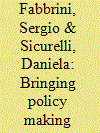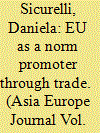|
|
|
Sort Order |
|
|
|
Items / Page
|
|
|
|
|
|
|
| Srl | Item |
| 1 |
ID:
086315


|
|
|
|
|
| Publication |
2008.
|
| Summary/Abstract |
While the major feature defining United States' (US) foreign policy since the Cold War has been the use of coercive means such as military power and economic sanctions, the European Union (EU) international role, despite recent attempts to develop military capabilities, remains that of a civilian power. The literature on transatlantic relations has explained this difference by stressing the different positions of the two actors in the international balance of power and pointing at their divergent value and normative frameworks. This article, by comparing the EU and US policy-making processes, introduces a further explanation. It argues that, although the two polities share the features of Compound Democracies, the different institutional organization of their foreign policy-making processes has generated powerful incentives for pursuing different kinds of international action.
|
|
|
|
|
|
|
|
|
|
|
|
|
|
|
|
| 2 |
ID:
090635


|
|
|
|
|
| Publication |
2009.
|
| Summary/Abstract |
Although foreign policy changes reflect transformations in the international system, they are also strongly conditioned by domestic factors. This is particularly true in the United States. Domestic factors have affected US decision-makers' interpretation of the international system and the role their country should play in it. That interpretation has gone through various phases, each characterised by a predominant paradigm or a struggle between competing paradigms. If the period between 11 September 2001 and the 2006 mid-term elections witnessed the uncontested success of unilateralism, after those mid-terms and the elections of 4 November 2008, the necessary domestic conditions for a new multilateral paradigm may have been created.
|
|
|
|
|
|
|
|
|
|
|
|
|
|
|
|
| 3 |
ID:
137812


|
|
|
|
|
| Summary/Abstract |
This paper investigates how the external images of the European Union (EU) shape its identity vis-à-vis the USA and focuses on how Vietnamese elites perceive EU-sponsored norms in the context of the ongoing bilateral trade negotiations. The EU emerges as an actor able to export regulatory standards, improve the status of its trade partner within multilateral forums and, at the same time, respect the local ownership of the development process. At the same time, it is criticized for the lack of coherence in its foreign policy, its internal divisions and intrusiveness in Vietnamese domestic politics. Moreover, differences emerge in the way government and non-governmental actors portray the EU, further challenging its univocal representation as a political leader. These perceptions have implications concerning the EU’s ability to export its constitutive principles and values to Vietnam. More broadly, this case study provides insights into the prospects of a future interregional trade agreement with the ASEAN and carries out a critical assessment of the identity and role of the EU as a normative power.
|
|
|
|
|
|
|
|
|
|
|
|
|
|
|
|
| 4 |
ID:
170514


|
|
|
|
|
| Summary/Abstract |
The European Commission has emphatically declared that the EU is committed to harnessing globalization by promoting a normative approach to trade. Based on the case study of the ongoing negotiations for a Comprehensive Economic Partnership Agreement (CEPA) with Indonesia, this paper scrutinizes the external conditions for the effectiveness of the European Union (EU) as a norm promoter. Despite the preference of the government to conclude the deal, so far, Indonesia has avoided taking a position on EU-sponsored norms concerning an investment court system and biofuel sustainability standards. This paper explains such a cautious attitude from an international political economy perspective. The proliferation of trade agreements concluded by the EU in the Association of South East Asian Nations (ASEAN) has mobilized the umbrella organization representing Indonesian exporter firms, which has a preferential status as interlocutor of the trade ministry, in support for the European proposals. At the same time, the low degree of trade dependency of the country has empowered Indonesian firms that enjoy the benefits of the large domestic market and, therefore, are in favor of the status quo. Indonesian civil society organizations are also divided on the opportunities and risks associated to the European normative approach to trade. This case study shows how the attempt of the EU to emerge as a normative power through trade has to face the complex political economy incentives and constraints shaping the trade policy of its negotiating partners.
|
|
|
|
|
|
|
|
|
|
|
|
|
|
|
|
|
|
|
|
|